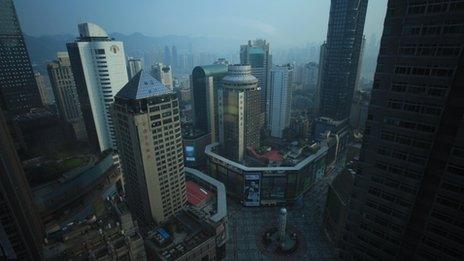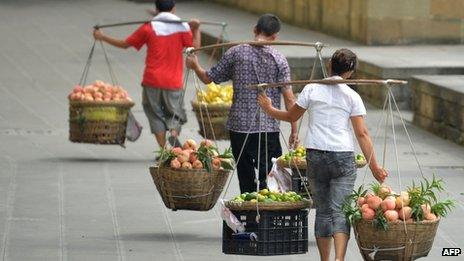Admiration lingers for Bo Xilai in China's Chongqing
- Published

Chongqing, where Bo Xilai used to be leader, is one of China's great cities
In a great, sweeping, snaking curve, the Yangtze river flows wide and fast through the city of Chongqing. Murky and polluted, full of dangerous undercurrents, its waters mix with the Jialing river. The point at which the two rivers meet is where Chongqing's skyscrapers rise, on a finger of land surrounded by water, like an inland Manhattan.
Chongqing is one of China's great cities, a river port filled with giant factories, the hub for a region of 30 million people. It was once a wartime capital, bombed by the Japanese. More recently riddled with mafia gangs, known for crime and corruption, the city has played a part in many of China's political dramas. It's here where you have to come to understand the rise, and now the fall, of Bo Xilai.
The catalyst for his demise was the murder, in Chongqing almost two years ago, of Neil Heywood. Mr Bo's wife, Gu Kailai, has already been convicted of that crime. She'd fallen out with her British business partner over their business deals and poisoned him. The killing was kept secret until Mr Bo's police chief fled to the US consulate in nearby Chengdu, exposing the scandal.
Bo Xilai's own trial in August riveted millions of Chinese. One of the most recognisable and popular politicians in China, he was one of the Communist Party's rising stars. His father had a prominent part in China's revolution. That makes Bo Xilai a Communist Party "princeling", so powerful many believed him almost untouchable.
Love for Bo
The court hearings were filled with revelations of infidelity and corruption in Mr Bo's family. There were photos of a secret villa in the south of France. Mr Bo didn't accept the charges meekly as most officials would. He called his wife "crazy", and his former police chief a "liar" for alleging he'd tried to cover up her crime.
Damian Grammaticas explains why Bo Xilai is likely to receive a long jail sentence
For the Communist Party it was an unedifying, damaging spectacle. But the party wants people to believe it is serious about tackling corruption and this case demonstrates how nobody is above the law, how the courts show no favour to the party's elites. But in Chongqing many believe it was really about eliminating Bo Xilai as a political force.
The centre of Chongqing is a pedestrianised shopping zone, now ringed with giant glass tower blocks gleaming in the sunlight. The area is full of brand new designer boutiques, names like Chanel and Tiffany & Co. Chinese families stroll past, snapping photos on their brand-new smartphones.
Bo Xilai was transforming Chongqing. As the local Communist Party boss, he oversaw its rise to become one of the fastest growing economic regions of China. He had a reputation as a decisive, effective leader, and despite his downfall, he's still admired in the city.
Zhang Anhao, a farmer who does part-time labouring jobs in the city, told me: "In Chongqing 80% of us approved of him. Honestly, all the ordinary people and low-level officials supported him. The 20% who didn't were corrupt officials, or thieves and robbers, because Bo cracked down on them. He was good at his job. He was making Chongqing a better place. What we need are more officials like him."
As he spoke, a woman walking past chimed in: "Chongqing people love Bo Xilai. Some officials just care about keeping their bosses happy. But Bo Xilai worked for the people. Who doesn't support him in Chongqing?"
Genuinely popular
The narrow streets that run uphill from Chongqing's riverside docks are crowded. Jostling their way through the throng are the city's famous porters, the bang bang men. From wooden poles balanced on their shoulders hang heavy loads, which they lug up and down the alleyways. Sweating and straining, they carry goods from the wholesalers to shops in the city.
The bang bang men liked Bo Xilai because he was addressing their needs. He was building cheap housing, tackling the mafia gangs, cleaning up crime and corruption, making the streets safer. He consciously appealed to those disillusioned by the country's huge inequalities, Chinese who feel most Communist officials don't care for the poor.

Mr Bo was admired for the way he cleaned up crime and corruption
"I think there must be a reason why he was arrested. But, as a politician, he was talented. He was making our city a safer place," said one bang bang man. Another added, "I don't know if he was corrupt, but we hope he can be released, and can come back to keep helping Chongqing develop."
Bo Xilai was genuinely popular in a way that other Communist Party politicians in China rarely are. He was flamboyant and confident, building his own powerbase of supporters outside the party and that may be why others in the leadership viewed him as a threat.
"Mr Bo actually had charisma, had revolutionary lineage and also had a political programme that had national appeal, which is a very potent combination in the Chinese system," says Professor Dali Yang of the University of Chicago.
"Most Chinese leaders are very bland, take their time, hide their views," explains Prof Yang. "Not Mr Bo, he had a strong policy platform emphasising anti-crime, egalitarianism and so on, while pushing the local economy forward very rapidly. So I'm pretty sure his fall is welcome to some members of the elite, but at the same time it's a deep loss for the people who supported him."
Bo Xilai's supporters in Chongqing certainly feel he has been brought down less because of any corruption on his own part, more because of rivalries among China's communist elites.
"Who isn't corrupt? I ask you which government official is not corrupt? All officials are corrupt. Bo was no different," I was told.
And one bang bang man, his shirt tied round his waist, was even more vocal: "It's clear he's not been treated fairly! What's happened to Secretary Bo isn't fair! It was a political power struggle that brought him down. Of course Secretary Bo was good."
Whatever Bo Xilai's sins, he's still admired by his supporters, particularly the poor and those who yearn for a more egalitarian China. They believe China's other elites are even more corrupt than Mr Bo may have been, more unaccountable, more distant. Bo Xilai at least able was to connect with ordinary people, to convince them he cared, so there's still affection for him.